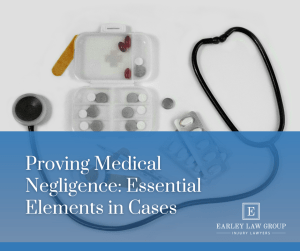Medical negligence cases are complex legal matters that arise when a healthcare professional’s actions or omissions deviate from the accepted standard of care, resulting in harm to a patient․ These cases involve a delicate balance of medical expertise, legal principles, and the emotional toll on those affected․ Understanding the nuances of medical negligence is crucial for both patients who suspect they have been victims and healthcare providers striving to deliver the best possible care․ This article aims to shed light on the essential elements and considerations involved in medical negligence cases․
What Constitutes Medical Negligence?
To establish a successful medical negligence claim, several key elements must be proven․ These include:
- Duty of Care: A doctor-patient relationship must have existed, establishing a legal duty for the healthcare provider to provide care․
- Breach of Duty: The healthcare provider’s actions (or inaction) must have fallen below the accepted standard of care that a reasonably competent professional would have provided in a similar situation․
- Causation: A direct link must be established between the breach of duty and the patient’s injury or harm․ This means proving that the negligence directly caused the damage․
- Damages: The patient must have suffered actual damages as a result of the negligence․ These damages can include physical pain, emotional distress, financial losses (medical bills, lost wages), and diminished quality of life․
Common Types of Medical Negligence
Medical negligence can manifest in various forms, impacting different areas of healthcare․ Some of the most frequently encountered types include:
- Misdiagnosis or Delayed Diagnosis: Failing to correctly identify a medical condition or delaying the diagnosis, leading to worsened outcomes․
- Surgical Errors: Mistakes during surgery, such as operating on the wrong body part, leaving foreign objects inside the patient, or damaging nerves or organs․
- Medication Errors: Prescribing the wrong medication, dosage, or failing to account for potential drug interactions․
- Birth Injuries: Negligence during childbirth that results in injuries to the mother or the baby․
- Anesthesia Errors: Mistakes made by anesthesiologists during the administration of anesthesia․
The Importance of Expert Testimony
In medical negligence cases, expert testimony is crucial․ Medical experts can provide valuable insight into the standard of care, the breach of duty, and the causation between the negligence and the patient’s injuries․ These experts, who are typically physicians in the same specialty as the defendant, can offer opinions on whether the healthcare provider’s actions deviated from the accepted standard and whether that deviation directly caused the patient’s harm․ Without expert testimony, it can be difficult for a plaintiff to prove their case․ The complexity of medical procedures and diagnoses often requires specialized knowledge that only a qualified expert can provide․ The legal process often hinges on these expert opinions, making their role indispensable in resolving these intricate claims, especially in difficult medical negligence cases․
Navigating the Legal Process
Pursuing a medical negligence claim can be a lengthy and challenging process․ It typically involves:
- Consulting with an Attorney: Seeking legal advice from an attorney experienced in medical negligence cases․
- Gathering Evidence: Collecting medical records, bills, and other relevant documentation․
- Filing a Complaint: Initiating a lawsuit by filing a formal complaint with the court․
- Discovery: Exchanging information with the defendant through interrogatories, depositions, and requests for documents․
- Negotiation or Mediation: Attempting to settle the case out of court through negotiation or mediation․
- Trial: If a settlement cannot be reached, proceeding to trial to present evidence and argue the case before a judge or jury․
The Statute of Limitations
It’s important to be aware of the statute of limitations, which sets a deadline for filing a medical negligence lawsuit․ This deadline varies by jurisdiction, and failing to file within the specified timeframe can result in the claim being barred․ It is essential to consult with an attorney as soon as possible to understand the applicable statute of limitations and protect your legal rights․
Medical negligence cases are undoubtedly complex․ Victims of medical negligence are often left with physical, emotional, and financial burdens․ Seeking legal counsel and understanding your rights are essential steps in pursuing justice and ensuring accountability․ And one of the things to remember is, in the pursuit of justice within medical negligence cases, victims must understand their rights and seek experienced legal counsel to navigate the complex legal landscape and ensure accountability for those responsible․


